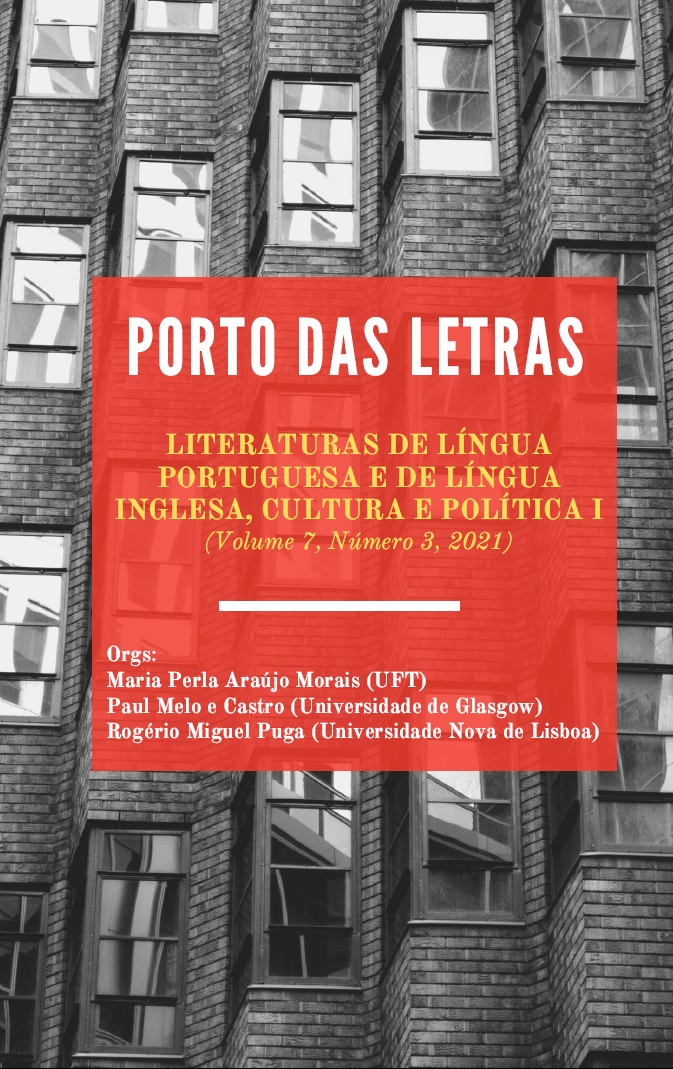O NARRADOR TESTEMUNHA ENTRE O PASSADO E O PRESENTE NO RESGATE DA HISTÓRIA NO CONTO “OS SOBREVIVENTES”, DE CAIO FERNANDO ABREU
Keywords:
Memória e ficção. Narrativa testemunhal. Função autor-realidade social.Abstract
This article is a reflection that has as object of analysis the short story "The Survivors", from the work "Strawberries moldy", by Caio Fernando Abreu, from the notion of narrator-witness of facts exed in the past and present in his discursive memory - the political experiences of the Military Dictatorship, in Brazil, in the decades of 1960 to 1980 - rescuing them so that they can be reorganized, attributing them due to meaning in the present before the loss of the ideals of the past. The methodology used is analytical-interpretative-reconstructive in nature of main (Caio) and secondary bibliographic research (BENJAMIN, 2005; BOSI, 2002; CALVINO, 1979; ECO, 2001; GAGNEBIN, 2006; ORLANDI (2004), PÊCHEUX (2007), SELIGMANN-SILVA, 2003). This investigation is interesting as a reading of the revision of the characters' past and their generation when it articulates with the notions of history, trauma and testimony of the reference visited by perceiving in this an experience split from a narrative transfigured by the crosscut and fragmented narration. This attitude adhered to by the storyteller can establish relationships in which unresolved antagonisms return to the narrative as the immanent problems of the characters. In this sense, by making use of formal fragmentation, the author establishes a connection between form of composition and narrated content, preserving in the very structure of the literary work insoluble conflicts and social antagonisms. Thus, in some way, the work of Caio Fernando Abreu predicts its reader, both the immediate interpreting and dynamic interpreting, that in the course of the interpretation of the tale can attribute the meanings evoked in the marks left by the author, thus becoming a model reader.
References
BENJAMIN, W. “Sobre o conceito de história”. Trad. Jeanne Marie Gagnebin e Marcos Lutz Müller. In: LÖWY, M. Walter Benjamin: aviso de incêndio. São Paulo: Boitempo, 2005, p. 41-142.
BOSI, A. Literatura e resistência. São Paulo: Companhia das Letras, 2002.
CALVINO, I. Se um viajante numa noite de inverno. São Paulo: Companhia das Letras, 1979.
ECO, U. Os limites da interpretação. São Paulo: Perspectiva, 2000.
ECO, U. Interpretação e Superinterpretação. São Paulo. Martins Fontes, 2001.
EAGLETON, T. Teoria da Literatura: uma introdução. Tradução Waltensir Dutra. 5ª. Ed. São Paulo: Martins Fontes, 2003.
GAGNEBIN, J. M. Lembrar escrever esquecer. São Paulo: Ed. 34, 2006a.
GAGNEBIN, J. M. Seis teses sobre as “teses”. Cult, ano 9, nº 106, set. 2006b, p. 50-53.
GINZBURG, J. Exílio, memória e história: notas sobre “Lixo e purpurina” e “Os sobreviventes” de Caio Fernando Abreu. Literatura e Sociedade (USP), São Paulo, n.8, p. 36-45, 2005.
KELSEN, H. Jurisdição Constitucional. Tradução de Alexandre Krug. São Paulo: Martins Fontes, 2003.
LINS, O. Guerra sem Testemunhas. São Paulo, Martins Editora, 1969.
MAGRI, M.M. Revisão da História e testemunho no conto “Os sobreviventes” de Caio Fernando de Abreu. Revista Escrita Ano 2010. Número 11. ISSN 1679-6888. 2010.
ORLANDI, E. Análise de Discurso: princípios e procedimentos. 5. ed. Campinas, SP: Pontes, 2003[1999].
ORLANDI, E. Interpretação: autoria, leitura e efeitos do trabalho simbólico. Campinas: Pontes, 2004[1996].
ORLANDI, E. As Formas do Silêncio: no movimento dos sentidos. 6.ed. Campinas, SP: Ed. Unicamp, 2007[1992].
PÊCHEUX, M. O discurso: Estrutura ou acontecimento? Tradução de Eni Orlandi. Campinas, Pontes, 1990[1983].
PÊCHEUX, M. Papel da memória. In: Pierre Achard. Papel da Memória. Tradução de José horta Nunes. 2. ed. Campinas, SP: Pontes Editores, 2007[1999]. p. 49-58.
PESAVENTO, S. J. (Org.). Fronteiras do milênio. Porto Alegre: Ed. Universidade/UFRGS, 2001.
SELIGMANN-SILVA, M. (Org.). História, memória, literatura. Campinas: Ed. Unicamp, 2003.
Downloads
Published
How to Cite
Issue
Section
License
Os autores concordam com os termos da Declaração de Direito Autoral, que se aplicará a esta submissão caso seja publicada nesta revista (comentários ao editor podem ser incluídos a seguir).

